How Oregon's Helfrich has emerged from Chip Kelly's enormous shadow

Life is good for Mark Helfrich. Scratch that: Life is great for Mark Helfrich. He oversees Oregon football, college football’s shiniest toy, chock-full of talent, blood-thirsty donors and a decade’s worth of BCS momentum behind it.
He’s making a boatload of money in a tiny town where such payscales aren’t required, where he can grow grey and his kids and future grandkids will forever be known by his lineage.
He’s 26–5 in two seasons and change, with a Rose Bowl win and a championship-game appearance under his belt. He’s dethroned Stanford, helmed a Heisman winner and seems poised to perpetuate his school’s seemingly inexhaustible factory of flash.
Life is good for Mark Helfrich, really good.
Also, life kind of sucks for Mark Helfrich. Because until he actually wins a national championship—something that has yet to be done at Oregon—he’s doomed to cull his cartoon stats in the shadow of the man who roamed before him: that portly, visor-wearing mad scientist who transformed Oregon from a cute, football-hipster sideshow into an explosive, catch-us-if-you-can juggernaut hell-bent on BCS bowls and conference titles.
When you’re forced to follow Charles “Chip” Kelly, that's just not fun.
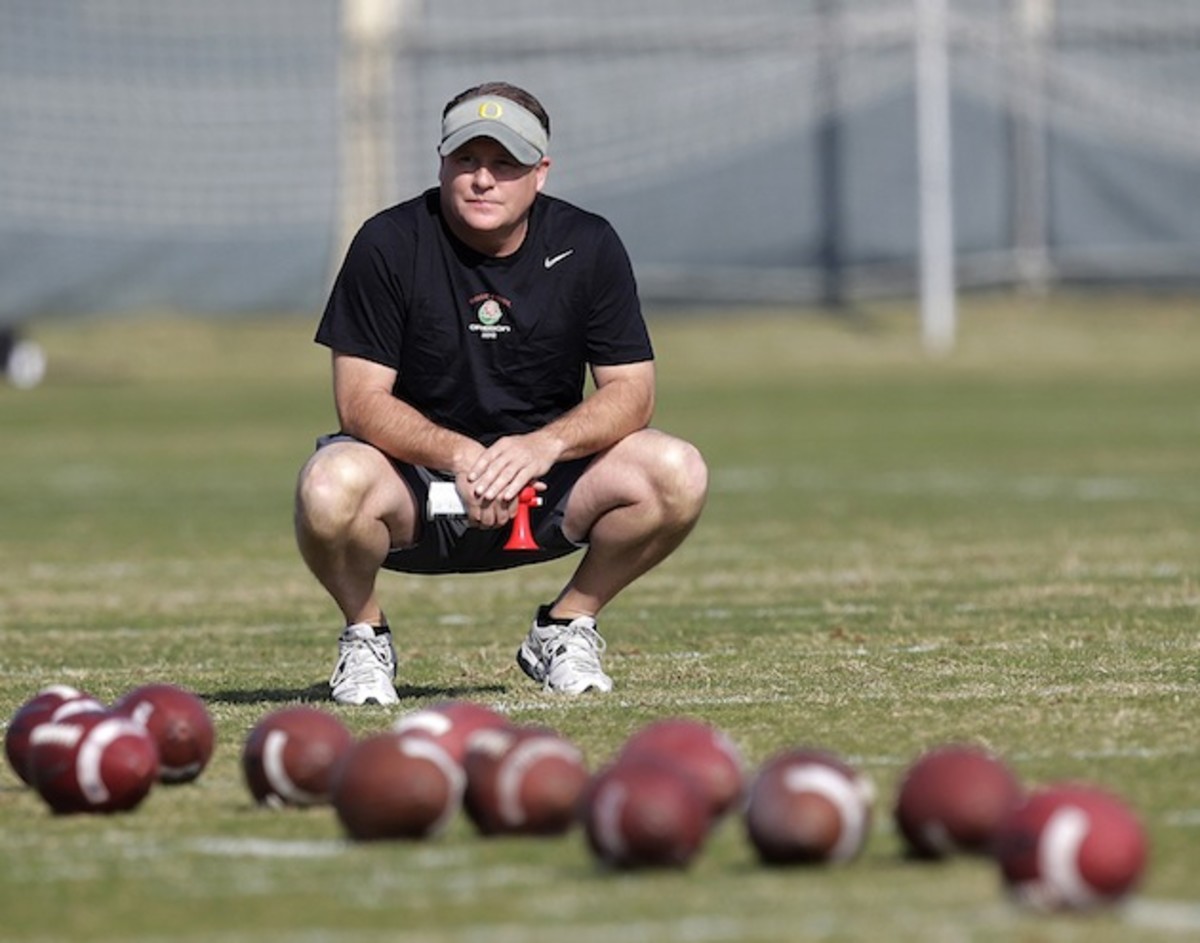
Kelly didn’t care about USC or boosters, Thanksgiving triple-headers or whether his team was about to line up against the ’85 Bears. He was a rebellious everyman, unafraid of anyone or anything, with an appeal that bordered on the cultish—for old-school alums and rabid students alike.
The perception, looking back through green and yellow glasses, is that Kelly did no wrong (despite evidence to the contrary). But, as Helfrich is fast finding out, perception can be a tough reality to crack. In his first two seasons as Oregon’s maestro, Helfrich notched the same record as his predecessor. He has already tallied the same number of bowl wins and national title game appearances as Kelly but with much less attention.
Michigan State claims No. 1 in college football Power Rankings after Week 3
So how did he get here? For 12 seasons, Helfrich was little more than a middling offensive coordinator, destined to be remembered as the guy who sent Colorado’s offense to a rocky grave. Never mind that he’d had successful runs at Boise State and Arizona State under Dirk Koetter (now the offensive coordinator for the Tampa Bay Buccaneers) or that he actually started his coaching career at Oregon as a graduate assistant under Koetter and head coach Mike Belotti, the latter of which had offered Helfrich a walk-on spot out of high school before he ended up at Southern Oregon.
In many ways, Helfrich started off a lot like Chip, working his way up, nose-to-grindstone, picking up whatever tidbits he could, the micro-substance of what would ultimately shape the sizzling style.
And let’s be clear about this: That style—a combination of many things, but neatly packaged to fans as a football philosophy somehow belonging exclusively to his sanctified predecessor—is as much Helfrich's as anyone’s.
In fact, it can be reasonably argued that Helfrich has already surpassed Kelly’s legacy. He usurped the crown of mighty Stanford, left a fantastic Michigan State squad choking on Marcus Mariota's rubber smoke and destroyed a Florida State team that was, to that point, unbeaten with Jameis Winston at the helm. He cracked the inaugural College Football Playoff and improved Oregon’s recruiting.
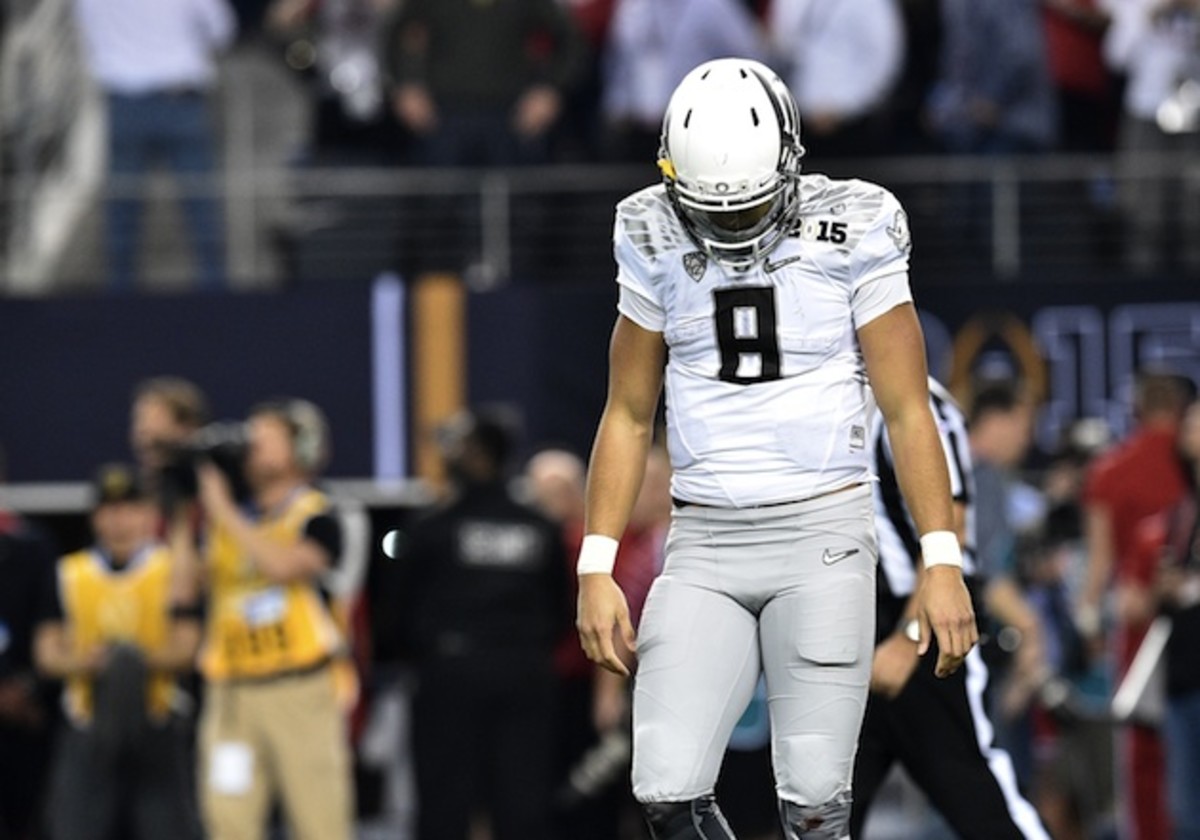
However, something Helfrich does have is the one thing Kelly never did: a non-BCS bowl appearance. And boy does that still stick in the craw of some fans.
For shame, Mark. For shame.
The pressure on Helfrich is building, even as Kelly’s shadow slowly fades away. Still, fans seem torn between an eagerness to embrace this man and a fear that every perceived step backwards — even a heroic 31–28 loss to the Spartans in East Lansing—means they’re somehow crashing back to reality, doomed to wake from their six-year fairytale ride.
How thin is the line between love and hate? Look no further than last year’s lone regular-season loss, a Thursday night showdown with Arizona in which Oregon entered the game beaten and bruised. Injuries on the offensive line had decimated the pace and execution of the offense, so much so that a true freshman in line to redshirt just two weeks earlier was starting on national TV.
The Ducks came up on the short end, and the heat heaved in the direction of Helfrich was genuinely mind-boggling. After finishing the 2013 season 3–2 in its final five games, a string that include a humiliating loss to the same Arizona team, Oregon was then 7–3 in its last 10 games overall (Kelly, as many were quick to point out, once went 27 games with only three losses).
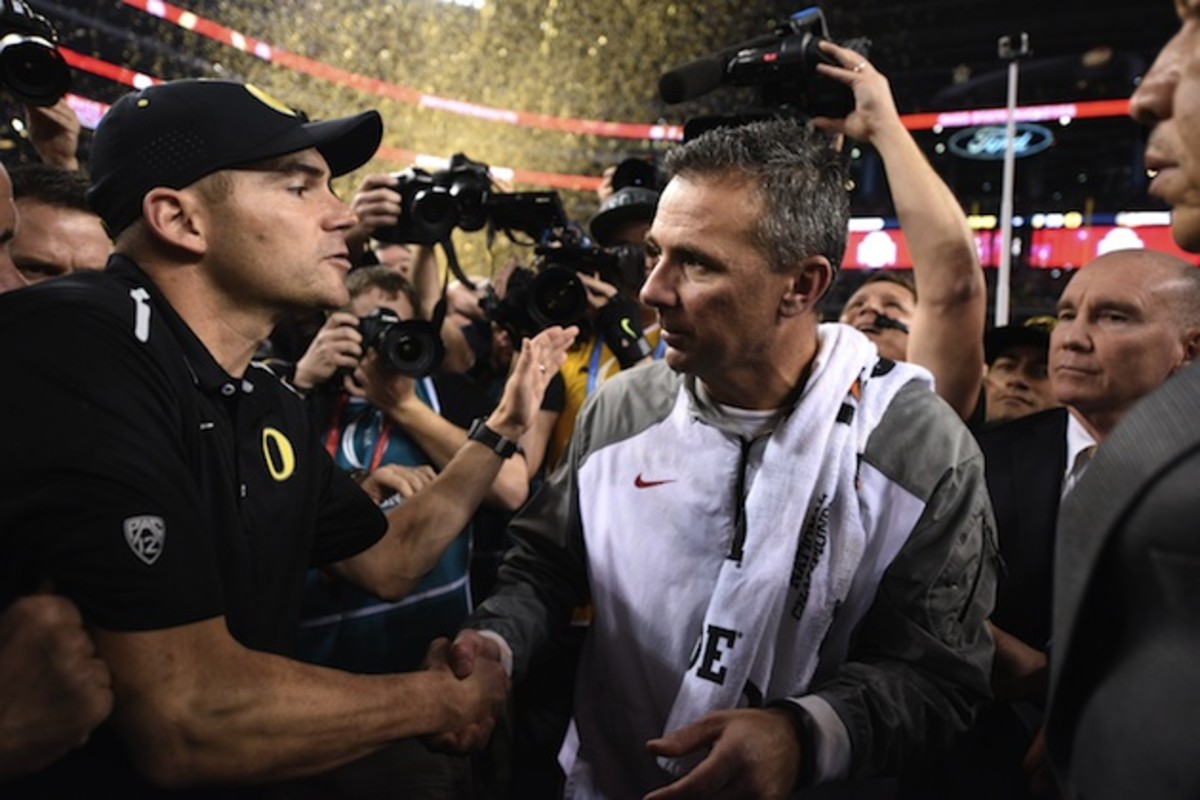
Perhaps the margin for error was smaller precisely because Helfrich seemed to be riding the coattails of Chip’s glory days—as offensive coordinator, no less, which, let’s face it, is a little like being Jimmy Page’s guitar tech. From a certain perspective, side-saddling Kelly seems like the easiest job in football, particularly given the nature of his personality. Ever gregarious, Kelly would take any criticism upon himself, a perpetual target often living in the crosshairs while Helfrich sat idly by, avoiding the flak.
He did his job, remaining relatively removed from the spotlight, silently guiding his squad. He was anonymous even to the media; Kelly simply was too big and too brash for anyone to care about anything else. In this dynamic, Helfrich was the hanger-on. This was Kelly's team and, damnit all, his offense, too.
It’s that perception that now gets magnified with every loss and what makes every win seem like a relief more than a cause for celebration.
Despite his deep ties with the program, to say nothing of Oregon’s reputation as an offensive head coach breeding ground, Helfrich’s hiring made almost no ripples outside of the state beyond some handwringing about how Oregon could possibly replace Kelly, as if no other program had ever been in a similar position. Indeed, Oregon’s previous head coaches have similarly been bred from within. Rich Brooks beget Belotti, who stepped aside for Kelly, who upped the bar before handing the program off to Helfrich.
[pagebreak]
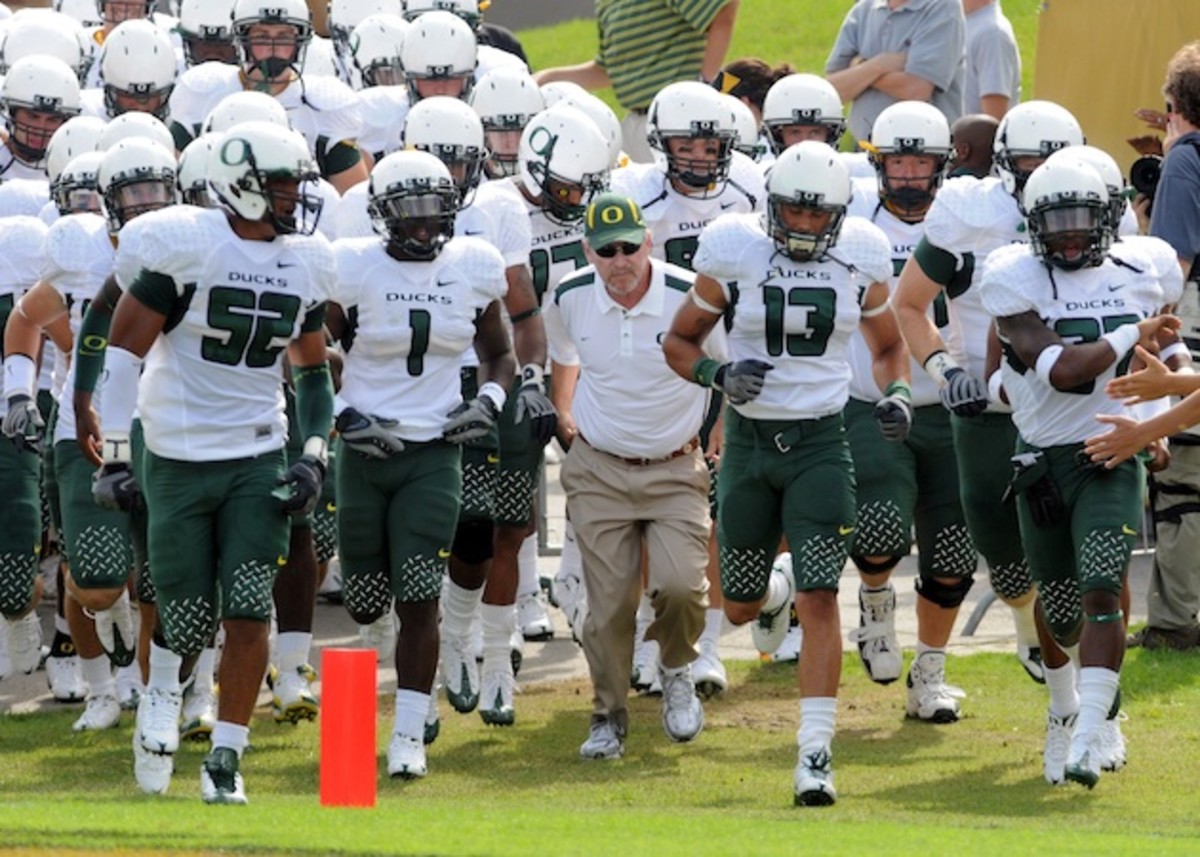
It was supposed to be simple. It’s the Oregon lineage: lots more, nothing less. There was just one problem: Kelly's system was unlike anything Eugene—or the rest of the country, for that matter—had ever seen.
Kelly was a gambler, an innovator, and in a small village like Eugene, that made him a demigod. No matter that he was a flirt, or that he ultimately fled back east; he was 46–7 over four years, went to four BCS games, won two of them, played for all the marbles and brought home three conference titles to a school had three in the previous 50 years.
Follow that up.
Heisman Watch: LSU's Leonard Fournette shines against Auburn
Owing to its flash and unconventional thinking, Oregon boasts a younger fan demographic than most, which is why Kelly’s hiring came with such seam-bursting fervor: Here was a coach experienced enough to build on what had come before him but young enough to want to author his own, unique legacy. For all Brooks and Belotti achieved, they were the perennial top-25 team that never quite got over the hump. There were flashes, of course, like the lightning-in-a-bottle Joey Harrington years, but even those were offset by teams that never quite made it.
Then, everything changed.
Kelly joined Oregon in 2007 as offensive coordinator, and with him came the excitement that had fallen stale under the better-left-unmentioned years of Andy Ludwig and Gary Crowton. In his first year as offensive coordinator, Kelly took a mentally shattered Dennis Dixon and turned him into a shoe-in Heisman winner before a crushing knee injury derailed his career. He made Jeremiah Masoli — JEREMIAH MASOLI! — an actual, real-life threat.
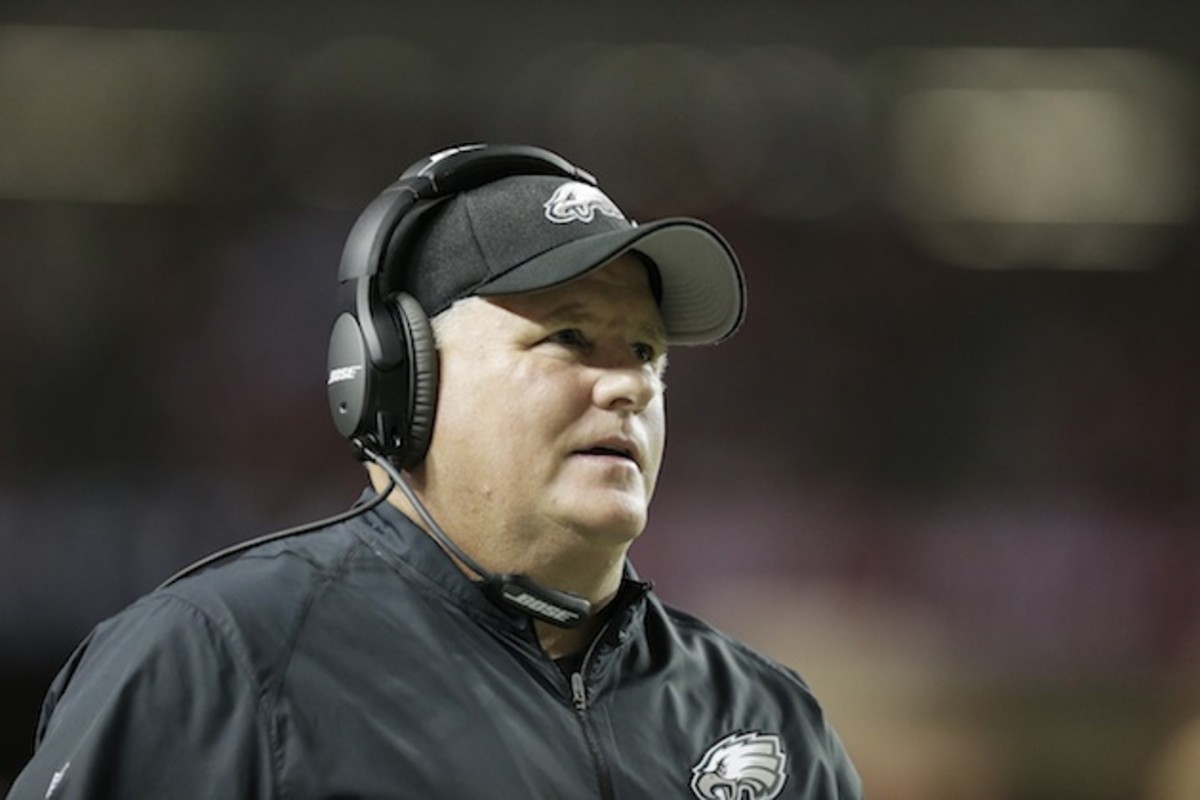
That kind of stuff, the stuff within the shinier stuff, is almost impossible to follow. But Helfrich has.
From the outside looking in, his disarming blend of down-home and cutthroat seems perfectly suited for a school like Oregon. Where many Oregonians see the extreme poles of the personality, Helfrich is actually smack-dab in the middle. He’s outgoing and self-deprecating when he wants to be and a straight shooter when he needs to be. He satisfies both the hardcore fan who wants to see opponents’ throats ripped out, yet gentile enough that the casual fan can find no reason to dislike him.
Yet for all he’s done so far and is almost certain to do in the future, Helfrich somehow finds himself locked in an unwinnable tangle with the past and the man who helped him scale that final rung hanging like an anchor on his foot. If Helfrich wins a title in the next two years, what will the narrative be? That he won with Kelly's guys? Will he have won with Kelly's system, just tweaked slightly to fit his particular style?
Three and Out: Stanford stuns USC, throws early Pac-12 race into chaos
Or will he get the credit that he deserves?
No one knows the pressure he’s under more than Helfrich himself. Perhaps that’s why he turned to an FCS star to replace the immortal Mariota and try to give the program some semblance of continuity. Maybe Helfrich just sees things differently, as he did when he snagged an unknown, lanky kid out of Hawaii and turned him into a Heisman-winning superhero.
Every coach wants to win week-in and week-out, and only a blessed handful can lay claim to being truly “safe” in their jobs. There’s just one minor detail: Most coaches aren’t following the football Phoenix known as Chip.
Owing to Phil Knight’s considerable backing, shrewd marketing moves and a couple lucky hires, Oregon has penciled their way into a top-tier college football program — particularly amongst millennials.
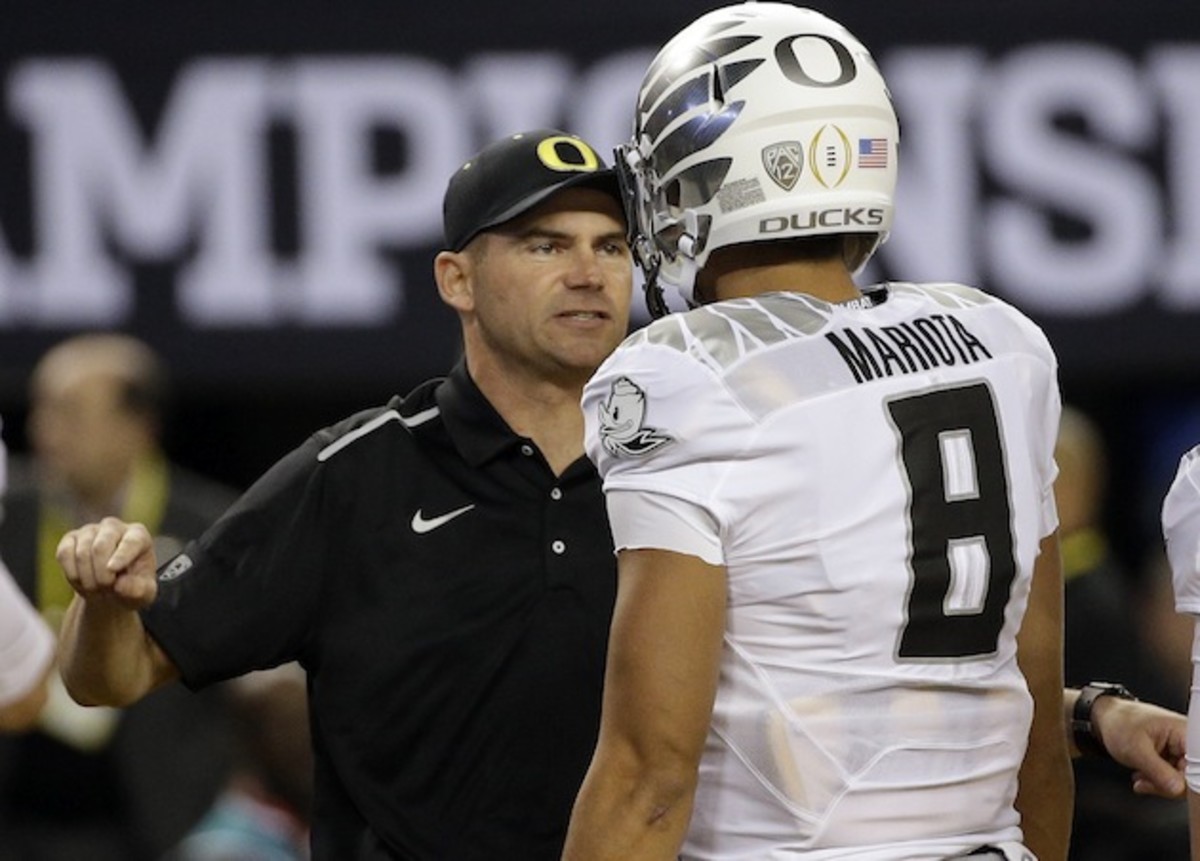
But is it sustainable? They’re no longer alone in the blinding-uniforms arms race, after all. And nor can they afford to fall back on nebulous concepts like “tradition”. To make matters worse, the breakneck speed upon which the Ducks have built their football fiefdom has seemingly been co-opted by half the competition. Everything Oregon does—and this is wholly to their credit—has been emulated across the country.
It’s innovative, it’s futuristic and, more important still, it draws in talent that likely wouldn’t come within sniffing distance of Eugene.
But when your trend-setting ways are no longer so, and survival suddenly requires you cook the steak to match the sizzle, can you? Ohio State, USC and Alabama sure can. Can Oregon afford a prolonged fall from the spotlight? Should that ever happen, could the Ducks find their way back again?
Three and Out: Biggest takeaways from Week 3 in college football
Perhaps that’s where Helfrich’s value is most significant: It feels like he’s in it for the long haul. The fear of him bolting off for greener pastures is tempered because, for him, Eugene is as green as it gets. Kelly was the brazen East Coaster who never truly fit in; his style was so unique, so unabashedly un-Eugene that it caught a spark where few others could have.
Then again, most sparks are doomed to fizzle. To become a truly elite college football program, one built to last, requires substance for that flicker to catch and to fuel the fire.
Kelly set down stakes long enough to take what he could from the landscape around him. Not Helfrich. He's using his team's slash-and-burn approach not just to build fires seen by every fan and football prospect from Eugene to Bangor, but to make the Oregon brand itself more fertile, sustainable, and—with any luck—even more exciting.

